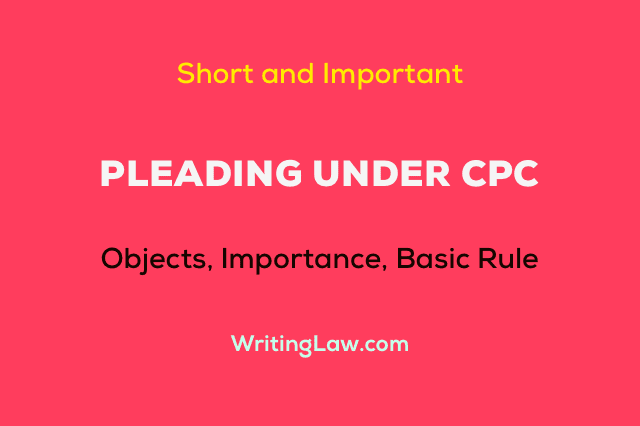
Pleading is the foundation of litigation. Pleading has been dealt with in Order 6 of the Civil Procedure Code. Order 6 Rule 1 of CPC defines pleadings as plaint or written statement.
The word ‘plaint’ is undefined in the code. However, it can be said to be the statement of claim – a document that contains the material fact by the presentation of which a suit is instituted in the court of law.
The word ‘written statement‘ has also not been defined in the code. In ‘Food Corporation of India vs Yadav engineer and contractor‘, it has been defined as a term of specific connotation ordinarily signifying a reply to the plaint filed by the plaintiff.
According to Cornell Law School, The pleading is the beginning stage of the lawsuit in which parties formally submit their claims and defences.
Objects of Pleading
Here are four objectives of pleading:
- Pleadings ascertain the actual issues between the parties.
- Pleadings state the issues to avoid surprise to the other party.
- Pleadings narrow down the area of conflict.
- Pleadings state the facts which need to be proved at the trial.
In ‘Virendra Kashinath vs Vinayak N. Joshi‘, the Supreme Court stated, “the object of the rule is twofold: First is to afford the other side intimidation regarding the particular facts of his case so that they may be met by the other side. Second is to enable the court to determine what is really the issue between the parties.”
Importance of Pleading
The fate of the suit lies on the pleading as;
- Pleading determines the burden of proof.
- It aids the court in the final decision of the case.
- Pleading enables the court to decide the right of the parties in the trial.
- Pleading enables the opposite party to know the case.
Basic rules of Pleading
Basic rules of pleadings are given in Order 6 Rule 2 of the Civil Procedure Code, 1908. They are as follows:
- Pleading should state the facts.
- The fact should be material facts.
- Pleading should not state the evidence.
- The facts stated in the pleading should be in a concise form.
Let us learn more about these four points in detail.
1. Pleading should state the facts.
The first rule of pleading states that the pleading should state the facts and only facts and not the law. Question of fact must be pleaded, i.e. the existence of any custom or usage, intention, waiver or negligence must be pleaded.
2. The fact should be material facts.
The second rule of pleading is that the facts stated should be material facts only and not the particulars. Material facts are the basic facts.
In ‘Virendra Nath vs Satpal Singh‘, the Supreme Court stated, “the phrase ‘material’ fact may be said to be those facts upon which a party relies for his claim or defence. In other words, ‘material facts’ are facts upon which the plaintiff’s cause of action or the defendant’s defence defends.” Whether a fact is a material fact or not differs from case to case and depends on the circumstances of the case.
3. Pleading should not state the evidence
The third rule of pleading is that the pleading should not state the evidence with which the material facts are to be proved. Facts are of two types:
(i) Facta probanda: the facts which need to be proved.
(ii) Facta probantia: the fact through which material facts are proved.
Facta probanda should be pleaded in the pleadings and not the facta probantia.
4. The facts stated in the pleading should be in a concise form.
The last fundamental rule of pleading is that the pleading should be in a concise form. Unnecessary and irrelevant details should not be added to the pleading. Instead, pleading should be precise, clear and specific.
Other rules of Pleading
Other rules of pleadings have been given under Rule 4 to 18 of Order 6 of CPC:
- Every pleading must be signed by the party or his pleader – Rule 14
- Particulars with date should be stated, wherever misrepresentation, fraud, breach of trust, wilful default or undue influence is pleaded in the pleading – Rule 4
- The effect of the document shall be stated briefly where the contents of any document are material – Rule 9
Related: Amendment of Pleadings
- What Is a Foreign Judgement and When It’s Not Binding in India - 26th July 2022
- What Are Second Appeals Under Civil Law - 23rd June 2022
- Civil Appeal as Per the Civil Procedure Code - 12th June 2022







